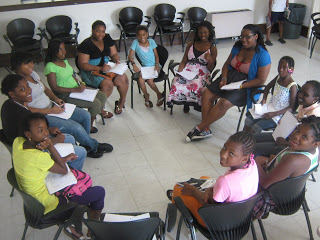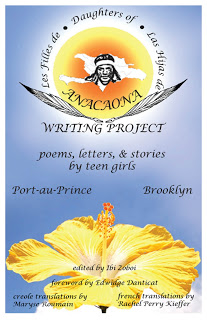2018 School Spending Survey Report
Ibi Zoboi On Literacy and Her Work with Haitian American Teens
Debut author and SLJTeen Live! speaker Ibi Zoboi talks about her writing initiatives for teens in immigrant communities.

Participants of the Daughters of Anacaona Writing Project program at the Flatbush branch of the Brooklyn Public Library.
Debut author Ibi Zoboi’s American Street (HarperCollins, Feb. 2017), an unflinching look at immigration and race, has already garnered lots of starred reviews and buzz. A longtime educator and writer, Zoboi, who recently keynoted SLJ/LJ’s Public Library Think Tank, has founded multiple projects focusing on the Haitian American and Haitian community. Her focus is on teen girls, both in Brooklyn and Haiti, and helping them get in touch with their critical reading and writing skills. She will be speaking on a panel about immigration and refugees in YA books during SLJ’s sixth annual SLJTeen Live! virtual conference on August 9. Can you tell me about the Daughters of Anacaona Writing Project (DAWP) and your work with it? Ibi Zoboi: Anacaona was a Taíno queen. Edwidge Danticat wrote an essay called “We are ugly, but we are here.” That’s a Haitian saying. [Danticat asks] “What is the legacy of the daughters of Anacaona, meaning the daughters of this heroine who fought for her people for so long?” We have a legacy of warrior women. So I named [the writing project] after that. And it was primarily aimed at Haitian and Haitian American teen girls, but I opened it up to Caribbean girls. [The project] first [took place] in the summer [of] 2009, and then I did it again in 2010 in Haiti. And it was a summer-long program where there was an exchange program between a Haitian girl and a Caribbean girl here in Brooklyn. I did it from 2009–2014. By 2013 it evolved into to something else—the Brooklyn Blossoms Book Club. I wanted to move it towards something literary and I wanted to fold the DAWP into the Brooklyn Blossoms Book Club. I worked with Teachers & Writers Collaborative, Community Word Project, [and] Sadie Nash Leadership Project, [doing] the same type of work but within schools. But that work was around writing and not necessarily around reading. [That] is why I shifted the focus of the DAWP to make it more literacy centered. I realized that there wasn’t a lot of critical reading in the classroom, which affected how they were able to write critically. My daughters are involved and [give a lot of] input. I wanted to make it girl-centered.
The cover to the Summer 2010 Daughters of Anacaona Writing Project collection of poems.
Are you still working on DAWP? IZ: It hasn’t gone anywhere, because I haven’t gone anywhere. It’s still in my creative space. I have to do [more] programming [and fundraising]. My writing took precedence because of time. But now I want to go back to it. I do have documentation if I need to do funding again. The writing part takes me to different parts of the country, but I feel the connection to my immediate community [when I work on this project]. I want to serve that community in some way in that same capacity. How would you expand the project? IZ: Because my role as an author now has shifted, one of the things I want to do [is] to get teen girls to review books online. A lot of [people] reviewing YA or middle grade books are in their 20s or older. [There are also many] teens, but not a lot of people of color (PoC) reviewers at all, and not young PoC reviewers. These girls have a lot to say about how they see themselves represented in books. That was the major thing that I wanted to do with [the Writing Project]. Because they have their own opinions about how they see themselves that sometimes reflects what adults are saying and sometimes doesn’t. Do you think that the critical reading that occurs in the program not only increases the girls’ critical reading skills but also enhances their rapport with the art itself? So that they can be creators of art not just critics of it? IZ: Absolutely, and that was where the writing project would go hand-in-hand. They’d be readers and content creators as well. I was a mentor for Girls Write Now. And with the aforementioned Sadie Nash [Leadership Project], and I’ve worked with girls in foster care. I’ve [also] worked with girls in alternative high school settings. So I’ve met a range of girls in different types of situations. More often than not, if they weren’t into poetry, they were into essays and giving their opinions. These girls are very, very opinionated about the world. It seems like the project involves extracting more details beyond “did you like it or did you not like it.” How did you propose talking about books when you were organizing these meetings? IZ: [I would often] see them in the classroom [and employ] the Socratic Method. The students [would] present their argument and back up their statements with facts in the book. It’s just a matter of taking that [approach] out of the classroom and bringing it into the community. I would love to get a community program [in which] kids get to have deeper conversations with kids who go to schools where the [Socratic method] isn’t used for a number of reasons, and have them experience each other in an environment that’s outside of their school.
Ibi Zoboi. Photo by Sonya Sones.
You mentioned wanting Haitian American youth to see themselves in their books. IZ: I did a whole workshop with these teen girls in 2013, three years after the earthquake. That was an eye-opener. I wrote down what they were saying about themselves, and [it] was shocking. The[se] Haitian girls had the worst to say about themselves and about Haitian people. Even if they’re not getting it at home, they hear about their culture in the media. Their reality is erased. There’s a certain narrative that is being perpetuated over and over again, and even at 14 and 15, they’re still taking that in. If they don’t have the critical skills to challenge those narratives, they continue to consume it. You don’t have the time to restart this project at this very moment with everything on your plate, but what would you share with the girls you’ll be meeting? IZ: [Do] not be afraid to be critical, especially in this day and age. I want them to build the confidence to speak up. I want them to be fearless.RELATED
RECOMMENDED
CAREERS
The job outlook in 2030: Librarians will be in demand
CAREERS
The job outlook in 2030: Librarians will be in demand
ALREADY A SUBSCRIBER? LOG IN
We are currently offering this content for free. Sign up now to activate your personal profile, where you can save articles for future viewing






Add Comment :-
Comment Policy:
Comment should not be empty !!!
Sonya Sones
Great article! I Just wanted to say that I took that photo of the lovely Ibi, and would love to receive photo credit. :) xx, Sonya SonesPosted : Jun 29, 2017 02:17